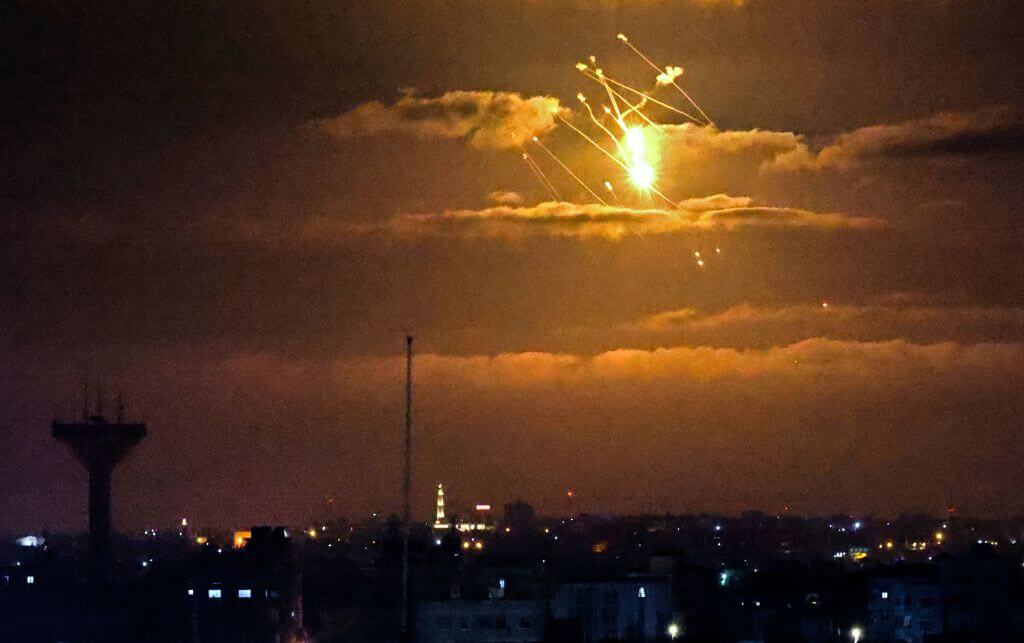Israel strikes Gaza after second rocket attack in 48 hours
Israel’s military described the attack as the most significant since last May’s fighting with the Hamas-controlled enclave.

Israeli Iron Dome missiles intercept incoming missiles fired from the Gaza Strip above the Palestinian enclave, on April 21, 2022. Photo by SAID KHATIB/AFP via Getty Images
This article originally appeared on Haaretz, and was reprinted here with permission. Sign up here to get Haaretz’s free Daily Brief newsletter delivered to your inbox.
Israeli jets struck the Gaza Strip early Thursday morning in what the IDF deemed “the most significant” attack on the enclave since the last major confrontation in May, after a day in which militants fired a rocket at an Israeli border city and Jerusalem stood on edge over a far-right march.
The strike from the Gaza Strip fell in an open area in the southern Israeli city of Sderot, failing to trigger the Iron Dome missile defense system, and the resulting shrapnel damaged a home.
In response, Israel attacked what it said was an underground facility used to manufacture rocket engines in the Gaza Strip. The strike “will lead to significant damage to missile production in the Strip,” an Israeli Defense Forces spokesperson said.
Near the time of the attack, around 2:00 A.M., the Iron Dome was activated against what was believed to be four rockets, and sirens were sounded in Israeli towns near the enclave, but the IDF later clarified that the alarm was triggered by gunfire.
Another launch was identified Thursday morning, which triggered further sirens, but the rocket failed to reach Israeli territory and landed in an open area inside the Strip, according to the IDF spokesman.
The unexploded rocket on Wednesday evening triggered sirens for the second time in 48 hours in the area, with the alarm sounded in Sderot, Ibim and the kibbutzim of Gevim and Nir Am. In Sderot, shrapnel landed in a house’s yard, causing several people to experience shock, including a 69-year-old man who was transferred to a hospital in Ashkelon. Several people were also lightly injured while seeking shelter, with some suffering panic attacks as a result of the rocket fire, according to Israel’s emergency medical service Magen David Adom.
Hamas spokesman Hazem Qasem said the Israeli strike would “strengthen the Palestinian people’s determination to continue resisting the occupation.” He promised that the organization would continue to protect Jerusalem and its holy sites “at all costs.”
Earlier on Wednesday, Jerusalem police blocked hundreds of right-wing Israelis from entering the Old City’s Muslim Quarter and holding a flag march there. Hamas had warned “the occupation leadership and the marchers” that they will bear full responsibility for the consequences of “dangerous and provocative moves.”
The military has been preparing for the possibility that rockets would be fired from Gaza this week following escalations in Jerusalem. Intelligence officials maintain that Hamas will not endanger any progress made since the last round of fighting last year, but that the current security situation remains fragile and that more radical factions from organizations in Gaza might try to fire rockets.
On Monday, the air force attacked southern Gaza in response to a rocket launched from the Strip. Earlier that day, the Iron Dome intercepted a missile from the Gaza Strip, in the first rocket launch for the enclave in four months.
Hamas, the militant group ruling the Gaza Strip, and Islamic Jihad have recently threatened to strike Israel after spiking tensions in Jerusalem, and in particular the entry of Israeli security personnel into Al-Aqsa Mosque. No group took immediate responsibility for the rocket strike.
This article originally appeared on Haaretz, and was reprinted here with permission. Sign up here to get Haaretz’s free Daily Brief newsletter delivered to your inbox.
A message from our CEO & publisher Rachel Fishman Feddersen
I hope you appreciated this article. Before you go, I’d like to ask you to please support the Forward’s award-winning, nonprofit journalism during this critical time.
We’ve set a goal to raise $260,000 by December 31. That’s an ambitious goal, but one that will give us the resources we need to invest in the high quality news, opinion, analysis and cultural coverage that isn’t available anywhere else.
If you feel inspired to make an impact, now is the time to give something back. Join us as a member at your most generous level.
— Rachel Fishman Feddersen, Publisher and CEO